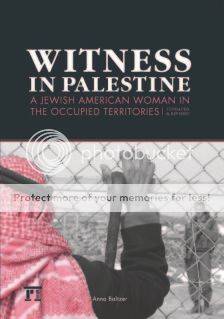This interview first appeared at iBrattleboro.com
where it was contributed by:Christian Avard
Image submitted by Anna Baltzer
Anna Baltzer on "The Daily Show"
A visit to the occupied territories of Palestine can change one's perspectives forever. Such was the case of Anna Baltzer. Baltzer is a Jewish-American granddaughter of Holocaust survivors. In 2002, she was awarded a Fulbright scholarship to teach English in Ankara, Turkey and soon after volunteered with the International Women's Peace Service in the West Bank. There she was exposed to the Israeli occupation of Palestine. She documented human rights abuses for the IWPS, returned to Palestine/Israel over the years, and published her experiences in a book called "A Witness in Palestine: A Jewish American Woman in the Occupied Territories."
Baltzer is a leading human rights activist on the Mideast and travels across the country to raise awareness about the Israeli-Palestine conflict. Her appearance on "The Daily Show" with Palestinian human rights activist Mustafa Barghouti was instrumental in raising awareness about life under the Israeli occupation of the West Bank and Gaza. I caught up with Baltzer and we discussed several topics including her "The Daily Show" appearance; occupation myths; Israeli apartheid and the boycott, divestment, and sanctions campaign; and the Mideast peace talks in Washington, DC.
Tell me about your experience on The Daily Show with Jon Stewart. Getting on mainstream television shows and talking about Palestine is incredibly difficult. What made that episode a reality and did your appearance on The Daily Show indicate that the mainstream media is beginning to explore the realities of the Israeli occupation of Palestine?
Someone with a contact at the show found my DVD transformative and sent in a press release for Mustafa Barghouti and me to be on. Barghouti was accepted immediately, and eventually they invited me too because I am Jewish and they thought therefore I would be a moderating influence. I don't believe it was their intention to have a Jewish Palestinian rights activist on and much of what I said of substance was cut out of the aired version, but they put the full version online and it went viral. I do believe that Stewart is sympathetic to the cause. I don't think it indicates a substantial shift in mainstream media trends, but given that I don't watch much mainstream media, I could be wrong! There seems to me a bit more openness than before to criticize Israel, thanks in part to Israeli atrocities that are growing too difficult to ignore.
How much of an impact did the atrocities of Operation Cast Lead and the Mavi Marmara flotilla have in opening people's eyes to the Israeli occupation of Palestine?
The impact has been huge. The "Israel is innocent and virtuous" narrative is no longer sustainable given these types of crimes, so in its place has been a propaganda campaign to convey how "complex" the issue is. "Yes," the narrative goes, "Israel sometimes does bad things, but it's just a cycle of violence and it's very complicated. We are working on it and you mustn't pressure us." This in some ways is more insidious than the previous narrative because it gives the illusion of balance where there is none and removes Israel's responsibility as the occupier.
Image submitted by Anna Baltzer
"Witness in Palestine" by Anna Baltzer
Calling it "complex" is a way of obscuring the reality and avoiding responsibility. Jewish emotions surrounding Zionism are complicated; the task of both sides healing in the future from years of conflict is complicated; but the injustice of Palestinians being oppressed and denied their fundamental human rights simply because of their ethnicity and religion is not complicated. The propaganda campaign is not working. Americans are increasingly open to the idea that Israel may not be the righteous, peace-seeking country they thought it was. When I tell people I'm a Palestinian human rights advocate, they express more interest and less alarm than they used to. The shift was already happening before 2008 but has accelerated exponentially since Operation Cast Lead and the Freedom Flotilla attacks. Israeli society is well aware of this shift, and there is a lot of internal discussion and hysteria about the way the Flotilla attacks reflected badly on Israel.
People think that Israelis don't care about the way the world perceives them, but that's not true. They care about the legitimacy of their country, their academia, their science, their economy, and their culture. This is why the Palestinian-led movement for boycott, divestment, and sanctions (BDS) on Israel is so powerful. It's their weak spotthe kind of pressure that works, in contrast to the historic futility of vapid diplomatic efforts. By the way, there is little internal Israeli discussion within about the legitimacy of the attacks on the flotilla. The morality of the killings of nine Turks is not questioned. The discussion is tacticalhow much can they get away with and shouldn't they have known better? Apparently their calculus is off because they seem to make one atrocious PR blunder over another, always at the Palestinians' (and occasionally their supporters') expense.
You have been traveling to Israel-Palestine for years now. Based on your experience and observations, what are the biggest myths about the occupation? What are the myths and what have you learned?
There are too many myths to name, but many fall into a few categories:
Myth 1: "This is an age-old conflict based on religion and mutual hatred." This is a conflict about land and human rights, not about religion. Prior to the Zionist movement, Jews were better treated in the Arab world than they were in much of the Christian West. There is nothing inherently incompatible about Jews, Muslims, and Christians, but with the introduction of the Zionist movement seeking toand eventually succeeding toannex Palestine for European Jews and one segment of the indigenous population while excluding and discriminating against the other segments of the population, you saw the emergence of violence. Israel was created and is maintained at the expense of Muslims and Christians in the area, who are denied their land and their human rights simply because they are not Jewish. This ongoing discriminatory system perpetuates the conflict today and until it is addressed we can expect no just or enduring peace.
Myth 2: "The occupation may be ugly, but it's for security"
(note the switch from the previous narrative that "there is no
occupation").
The majority of the institutions of Israel's occupation simply cannot be
justified by security. Israel pays its citizens to move from Israel to
the West Bank to live amidst the so-called "enemy"does that make them
safer? Israel has never declared its own borders, rather it expands them
onto more and more of someone else's landdoes that make Israel safer?
Israel denies Palestinians sufficient water from their own water
sourcesDoes that make Israelis safer? Although the narrative of
"security" as motivation is accepted without question in mainstream
media, it simply doesn't make sense when you look at the situation on
the ground. Cutting Palestinians off from their families, schools,
hospitals, and livelihoods will never make Israelis safer. If Israel is
serious about ending Palestinian violence, it must acknowledge the roots
of that violence.
(Note: You can view every article as one long page if you sign up as an Advocate Member, or higher).







